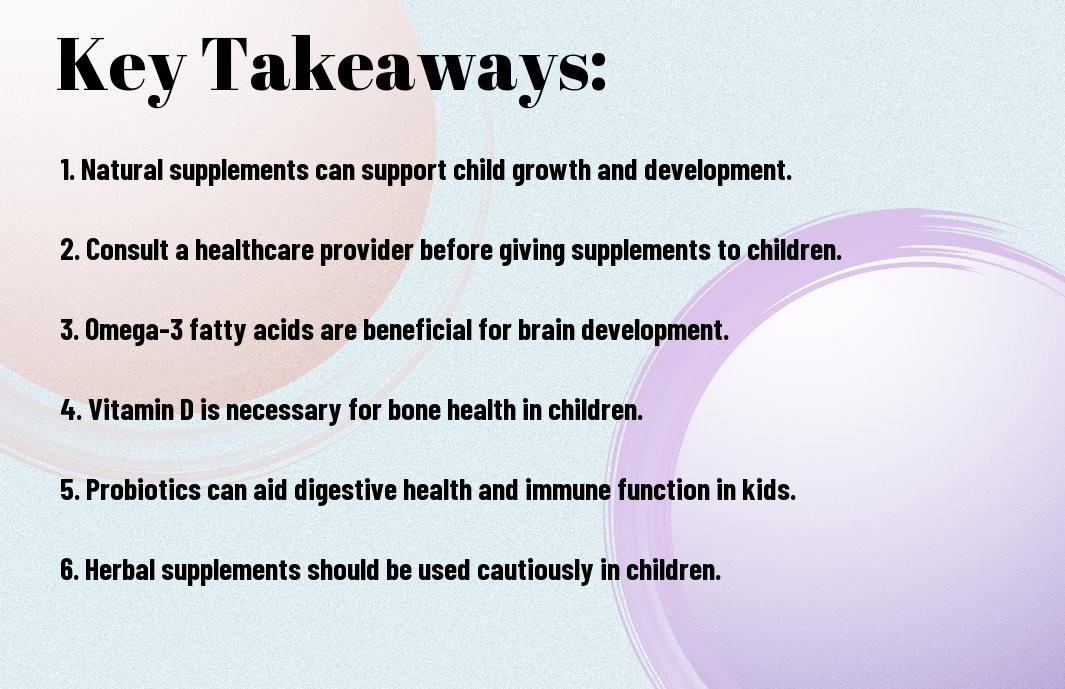There’s a growing interest in natural supplements for child development, but what exactly are their roles? In this article, we’ll explore the benefits and risks of incorporating natural supplements into a child’s diet and discuss which ones are supported by evidence and safe for use. Understanding the potential impact of natural supplements on child development can help parents make more informed decisions regarding their children’s health and well-being.
Table of Contents
Key Takeaways:
- Supplements can play a complementary role: Natural supplements can be a helpful addition to a child’s diet to fill in any nutritional gaps or support specific aspects of their development.
- Consult a healthcare provider: It’s crucial to consult with a healthcare provider before introducing any supplements to a child’s routine to ensure safety and appropriateness for their individual needs.
- Focused supplementation may be beneficial: In some cases, targeted supplementation with specific nutrients like omega-3 fatty acids or vitamin D can support brain development, immune function, and overall health in children.
- Whole foods are key: While supplements can be useful, they should not replace a healthy diet rich in whole foods that provide vital nutrients and promote overall well-being.
- Quality matters: When considering natural supplements for children, opt for reputable brands that undergo third-party testing for quality, purity, and potency to ensure efficacy and safety.

The Importance of Nutrition in Child Development
The Role of Essential Nutrients
While many factors contribute to a child’s development, nutrition plays a crucial role in ensuring healthy growth and cognitive function. Essential nutrients such as vitamins, minerals, proteins, and fats are vital for supporting the body’s overall health, brain development, and immune system.
The Impact of Nutrient Deficiencies on Development
Importance of ensuring children receive an adequate intake of crucial nutrients cannot be overstated. Nutrient deficiencies can lead to stunted growth, cognitive impairments, weakened immune systems, and even neurological disorders. It is crucial to provide a balanced diet rich in crucial nutrients to support optimal growth and development.
The consequences of nutrient deficiencies on child development can have long-lasting effects. Deficiencies in key nutrients such as iron, vitamin D, and omega-3 fatty acids have been linked to developmental delays, learning disabilities, and behavioral problems in children. Ensuring children receive a well-rounded diet and, if necessary, supplementation can help prevent these issues and support healthy development.
What Are Natural Supplements?
Some Unveiling the Vital Role of Multivitamins in Children’s Development are vital for bridging nutritional gaps and supporting overall well-being in children. These supplements are formulated to provide a convenient way to ensure children receive an adequate intake of vital nutrients.
Definition and Types of Supplements
- Multivitamins: Comprehensive supplements that contain a variety of vital vitamins and minerals.
- Probiotics: Supplements that support gut health by introducing beneficial bacteria.
- Omega-3 fatty acids: Essential for brain development and overall health.
- Vitamin D: Important for bone health and overall immunity.
- Iron: Vital for red blood cell production and cognitive development.
Perceiving the specific nutritional needs of children can help parents make informed decisions about supplementing their diet.
Common Ingredients Used in Supplements
An array of supplements are available to support children’s growth and development. These products often contain vitamins, minerals, and nutrients that may be lacking in a child’s diet. It’s important to choose supplements with high-quality ingredients and consult with a healthcare provider before starting any new regimen.

Benefits of Natural Supplements in Child Development
For Dietary Supplements for Toddlers, natural supplements play a crucial role in supporting the overall development of children. These supplements can provide crucial nutrients that may be lacking in a child’s diet, aiding in their growth and well-being.
Supporting Brain Development and Function
Brain development in children is vital for cognitive function and learning abilities. Natural supplements containing omega-3 fatty acids like DHA and EPA can support brain development and function, enhancing memory, focus, and overall cognitive performance.
Boosting Immune System Function
Immune function is pivotal in protecting children from illnesses and infections. Natural supplements such as vitamin C, vitamin D, and zinc can help boost the immune system, reducing the risk of common colds, flu, and other infections.
Promoting Healthy Growth and Development
Development of children encompasses physical growth, emotional well-being, and cognitive abilities. Natural supplements rich in crucial vitamins, minerals, and antioxidants support the healthy growth and development of children, ensuring they reach their full potential.

Key Natural Supplements for Children
Omega-3 Fatty Acids
Unlike adults, children may not always get an adequate amount of Omega-3 fatty acids in their diet. Omega-3 fatty acids are crucial for brain development and have been linked to improved cognitive function and behavior in children.
Vitamin D
Fatty fish and fortified dairy products are good sources of Vitamin D. This vital vitamin plays a vital role in bone health and immune function. Children who don’t get enough Vitamin D are at risk of developing rickets and other health issues.
Probiotics
With the rise in digestive issues among children, probiotics have gained attention for their potential to support gut health and boost the immune system. These beneficial bacteria can help maintain a healthy balance in the digestive system.
Iron and Other Essential Minerals
Acids
Iron, zinc, and magnesium are just a few examples of vital minerals that are crucial for children‘s growth and development. Children who lack these minerals may experience stunted growth, weakened immune function, and other serious health problems.
Safety Considerations for Natural Supplements
All-natural supplements can be beneficial for child development, but it’s necessary to consider safety factors.
Potential Interactions with Medications
Any natural supplement has the potential to interact with medications your child may be taking. Consult with a healthcare professional before introducing new supplements to avoid any adverse reactions.
Allergic Reactions and Side Effects
For children, allergic reactions and side effects to natural supplements are rare but possible. It’s crucial to monitor your child closely after introducing a new supplement and be aware of any unusual symptoms.
Another critical aspect to consider when using natural supplements for child development is quality control and regulation.
Quality Control and Regulation
Reactions to natural supplements can vary as they are not as strictly regulated as pharmaceuticals. It’s necessary to choose reputable brands that adhere to high-quality standards to ensure the safety and efficacy of the supplements you are giving your child.
It’s crucial to approach the use of natural supplements for child development with caution and awareness of potential risks. Always consult with a healthcare provider before adding any new supplement to your child’s regimen.
Choosing the Right Natural Supplement for Your Child
Consulting with a Healthcare Professional
After considering giving your child a natural supplement, it is crucial to consult with a healthcare professional. They can provide guidance on the appropriateness of the supplement for your child’s specific needs and health conditions.
Reading Labels and Product Reviews
Supplement labels and product reviews can offer valuable information about the quality and efficacy of a product. Before choosing a supplement for your child, carefully read the labels and consider checking for reviews from reputable sources.
To ensure that the supplement is safe and meets your child’s nutritional requirements, look for key information such as the list of ingredients, dosage recommendations, and any potential allergens.
Considering Age and Individual Needs
Healthcare professionals can help determine the appropriate dosage and type of supplement based on your child’s age and individual needs. Factors such as diet, existing health conditions, and developmental stage should be taken into account when selecting a supplement.
Another important consideration is to look for supplements specifically formulated for children, as they may have tailored doses and formulations that are suitable for their growing bodies.
Final Words
To wrap up, natural supplements can play a supportive role in child development when used appropriately and under the guidance of a healthcare provider. While they should never replace a balanced diet, certain supplements like omega-3 fatty acids and vitamin D may be beneficial in supporting healthy growth and development. It’s important to remember that every child is unique, and what works for one may not work for another. Consulting with a healthcare provider before introducing any supplements is always recommended to ensure the safety and efficacy for your child.
FAQ
Q: What are natural supplements?
A: Natural supplements are products made from natural ingredients like plants, minerals, or animal byproducts that are used to supplement the diet and provide health benefits.
Q: How do natural supplements contribute to child development?
A: Natural supplements can play a role in supporting child development by providing imperative nutrients that may be lacking in a child’s diet, helping to fill nutritional gaps and support overall health and well-being.
Q: What are some common natural supplements for child development?
A: Common natural supplements for child development include omega-3 fatty acids (such as fish oil), vitamin D, probiotics, multivitamins, and herbal remedies like chamomile or valerian for calming and relaxation.
Q: Are natural supplements safe for children?
A: Natural supplements can be safe for children when used appropriately and under the guidance of a healthcare provider. It’s important to choose high-quality products, follow recommended dosages, and consider individual health needs and potential interactions with medications.
Q: How can I incorporate natural supplements into my child’s diet?
A: Natural supplements can be incorporated into a child’s diet in various forms, such as liquid drops, chewable tablets, or powder mixed into food or drinks. It’s a good idea to consult with a pediatrician or nutritionist to determine which supplements may be beneficial for your child based on their unique needs and diet.
Recent Posts
Revitalize your health with an innovative detox approach offered by Root Wellness. This powerful solution enhances wellness through natural ingredients like zeolite and silica, effectively cleansing...
Roots Clean Slate Erfahrungen Revitalize With Bioavailable Silicon
Revitalizing your health begins with a natural approach to removing harmful substances. Detoxification can pave the way for a more vibrant life through effective cleansing methods. Bioavailable...


